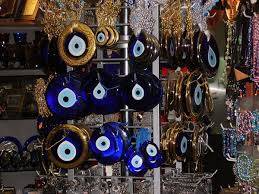Turkish religious authority has highlighted rising concerns on the use of eye-shaped blue glass ornament forbidden under Islam.
According to a report in Al Jazeera, the proliferation of the eye-shaped blue glass amulets in Turkey is widespread, as is the belief in their ability to ward off malevolent or jealous intentions.
But a recently published fatwa by the Diyanet, a body that governs matters pertaining to Islam in Turkey, denounced the use of the ornaments locally known as nazarlik or nazar boncugu.
“Although the nature and condition of the evil eye are not known precisely, it is accepted by religion that some people can create negative effects with their gaze,” the Diyanet said in an advisory published on its website.
“In our religion, attitudes, behaviours and beliefs that attribute the ultimate influence on anything other than Allah are forbidden. For this reason, it is not permissible to wear evil eye amulets and similar things around the neck or anywhere for the purpose of benefiting from them.”
A professor of art history at Istanbul’s Bahcesehir University, Nese Yildiran said the blue colour of the beads relates to the sky god of the Central Asian Seljuk Turks.
“The Great Seljuks who accepted Islam continued the use of this colour in architectural decoration,” she said, adding that the use of two shades of blue, cobalt and turquoise in Muslim art “was also the result of expression with the understanding of Islam”, which incorporated the name of God and Arabic calligraphy.
It was used as gift, worn as jewellery and adorn homes and workplaces across the country and the world. Depicting theme of amalgamating ancient folklore with digital era, a nazarlik emoji was created in 2018.






